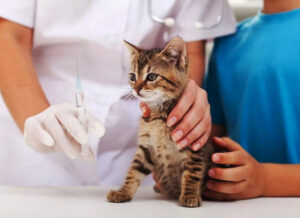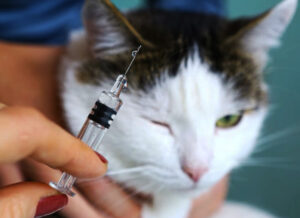Introduction
One of the most crucial steps toward a long and healthy life for your cat is to vaccinate. Cat Vaccinations can save your pet from the worst diseases and protect other pets in the household from infections. Thus, as a first-time owner or a seasoned pet parent, it is necessary to understand what vaccinations your cat needs, the schedule of administration, and how they work.
In this blog, we will cover all things that you need to know about cat vaccinations, including core and non-core vaccines, vaccination schedules, side effects, costs, and frequently asked questions.
Why Are Cat Vaccinations Important?
Cat Vaccinations function by activating the immune system in your cat, allowing it to recognize and fight off dangerous pathogens. In the absence of adequate vaccinations, cats can be left defenseless against chronic conditions that could lead to serious health problems or even death. Along with other conditions, rabies is an example of a zoonosis that can have negative consequences for humans and is thereby controlled by some vaccines.
Accrued benefits of vaccinations on cats include:
- Disease Prevention: Prevention of fatal conditions such as leukemia in felines and rabies.
- Publics Health Protection: Reduces the chances of spreading zoonotic diseases to other people.
- Longer Life Span: Increases life expectancy for longer life.
- Cost-Effective Care: Saves resources that would have been spent in treatments of diseases that could have been prevented.
Core vs. Non-Core Cat Vaccinations
Cat vaccines are divided into two categories: core and non-core vaccines.
Core Cat Vaccinations
Core vaccines are essential for all cats, regardless of lifestyle, because they protect against common and potentially fatal diseases.
1. Rabies
- Many countries have it as a law requirement.
- It prevents rabies, which is a fatal viral disease that can affect animals and humans alike.
- It is administered as a single dose with boosters every 1-3 years.
2. Feline Panleukopenia (FPV) (Feline Distemper)
- This is a very contagious and usually fatal disease.
- It causes severe gastrointestinal problems, fever, and dehydration.
- It is usually given in combination vaccines (FVRCP).

Distemper Vaccine Cats
Distemper vaccine cats, which is called feline panleukopenia vaccine, is one of the core vaccines given to a cat in order to immunize it against such a highly contagious and deadly virus. Panleukopenia, commonly known as feline distemper, attacks cells that divide quickly in a cat’s body, resulting in:
- Severe vomiting and diarrhea
- Fever and lethargy
- A weakened immune system, which makes cats prone to secondary infections
Most at risk are kittens and unvaccinated adult cats, hence the importance of timely vaccinations.
FVRCP Vaccine for Cats
FVRCP is a multivalent vaccine which protects against three highly contagious diseases in felines:
- Feline Viral Rhinotracheitis (FVR): This is caused by feline herpesvirus-1, characterized by respiratory infections, eye discharges, and sneezing.
- Calicivirus (C): It results in mouth ulcers, respiratory problems, and joint pain.
- Panleukopenia (P): Commonly known as feline distemper. It causes serious gastrointestinal symptoms and immune suppression.The FVRCP vaccine is a must for all cats, with initial doses given during kittenhood and regular boosters throughout adulthood.
FVRCP Cat Vaccine Schedule
Age Vaccine
6-8 weeks FVRCP (1st dose)
10-12 weeks FVRCP (2nd dose)
14-16 weeks FVRCP (3rd dose)
1 year FVRCP booster
Every 1-3 years FVRCP booster as needed
Non-Core Vaccines
These vaccines are optional and they are required based on lifestyle, environment, and risks within your cat’s life.
1. Feline Leukemia Virus (FeLV)
- Recommended in cats that stay outdoors or can get close exposure to other felines.
- Infectioused saliva, nasal mucous and proximity.
- Results in immunosuppression, anemia and some cancers.
2. Bordetella
- Recommended for cats in multi-cat households or boarding facilities.
- Prevents respiratory infections.
3. Chlamydophila felis
- Protects against bacterial infections that cause conjunctivitis.
- Often included in respiratory vaccines.

Potential Side Effects of Cat Vaccinations
Most cats tolerate vaccines well, although some may suffer from mild reactions, such as:
- Mild fever
- Lethargy
- Temporary loss of appetite
- Swelling at the injection site
- Sneezing or mild respiratory symptoms (if given intranasally)
In extremely rare cases, severe reactions including allergic reactions, vomiting, and difficulty breathing have been reported. If you experience any of the following, consult your veterinarian as soon as possible.
Frequently Asked Questions (FAQs)
1. Can indoor cats skip vaccinations?
No, even indoor cats need core vaccinations since some viruses can be carried into the home on clothes or other pets. Rabies vaccination is also required by law in many areas.
2. What happens if my cat misses a booster shot?
If a booster shot is missed, consult your veterinarian. In some cases, the vaccination schedule may need to be restarted to ensure full immunity.
3. Are there risks associated with over-cat vaccinations?
Yes, over-vaccination can cause adverse reactions. Many veterinarians now use titer testing to check immunity levels and avoid unnecessary boosters.
4. Can a vaccinated cat still get sick?
Vaccines significantly reduce the risk of infection, but they are not 100% foolproof. However, vaccinated cats that do contract a disease often experience milder symptoms and recover faster.
5. Is pet insurance useful for cat vaccinations costs?
Some pet insurance plans cover vaccination costs under wellness packages, which can help manage expenses.
Conclusion
Maintaining feline health and preventing infectious diseases is only possible through the use of vaccinations in cats. With a proper vaccination schedule, booster shots, and consulting with your veterinarian to make personalized recommendations, you will be able to ensure that your cat stays healthy and protected all the way to its old age.
If you have questions or concerns about vaccinations for your cat, do not hesitate to ask a licensed veterinarian. A little precaution today will save your furry friend from some serious health issues in the future!
By following this comprehensive guide, you’ll be well-equipped to make informed decisions about your cat’s vaccinations and overall health. Prioritize prevention, and your feline companion will enjoy a long, happy life by your side!


